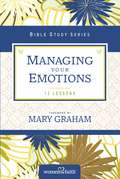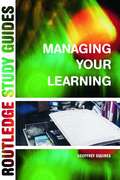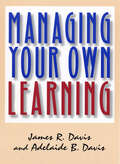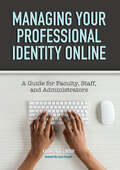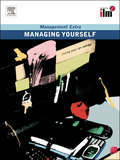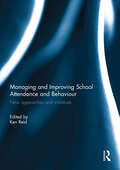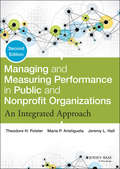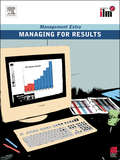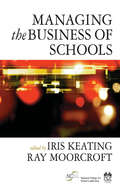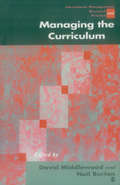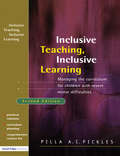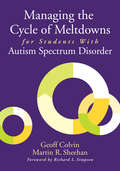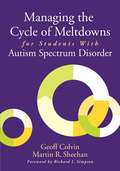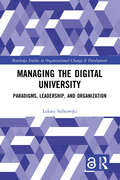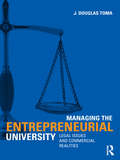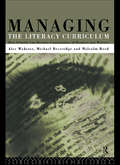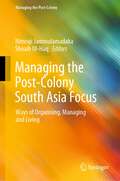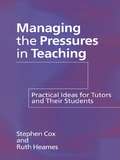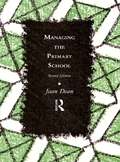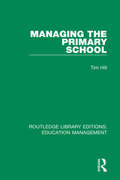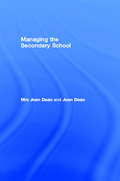- Table View
- List View
Managing Your Emotions (Women of Faith Study Guide Series)
by Women Of FaithMost of us live at the mercy of our emotions. When we’re up we’re happy, content, and joyful, but when we’re down we’re depressed, angry, and frustrated. What’s more, we often have mixed emotions, conflicting emotions, or fleeting emotions. All of this leaves us feeling at war with ourselves. In this study, readers will discover that there is hope! While we can’t necessary control what we feel, we can manage how we react to those emotions. We can lean into the feelings that God has given each of us, explore what God says about them in His Word, and learn God’s perspective on how to manage them. When we do, we will find that our emotions can be our allies!
Managing Your Learning (Routledge Study Guide Ser.)
by Geoffrey SquiresThis book is about analysing, understanding and managing the way you learn. Whether you are working towards a formal qualification, are undertaking work-related training or are learning informally by yourself, Managing Your Learning will help you to assess and build on your strengths, and identify and improve your weaknesses.You can use this book by yourself or in an organised group or class. There are 25 sections, each containing:*a diagnostic questionnaire on a specific aspect of learning*key points to explore*suggestions for further actionEach chapter has sections for you to make notes about your own situation, and there is advice on computers, presentations and other study skills. By the end of the book, you will have developed an individual learning profile and worked out a personal action plan.
Managing Your Moods (Women of Faith Study Guide Series)
by Thomas NelsonFilling the needs of today's women, we offer the next 4 titles in the best-selling Women of Faith series.These topical guides deal with issues that women wrestle with today, such as friendship, encouragement, managing moods, finding contentment, and how to live out your faith. Reaching an audience across racial, socio-economic, denominational, and age boundaries, these guides will enhance the lives of women as they empower them in their weekly devotions. The study guides can be used for both individual and group settings. Women are asking good questions about their faith. With our study guides, we want to join them in their quest for knowledge and lead them in finding the answers they are seeking. The Study Guide Series will include the following:#5 Managing Your Moods - Foreword by Marilyn Meberg ISBN: 0-7852-5151-0#6 Cultivating Contentment - Foreword by Luci Swindoll ISBN: 0-7852-5152-9#7 Encouraging One Another - Foreword by Nicole Johnson ISBN: 0-7852-5153-7#8 A Life of Worship - Foreword by Sheila Walsh ISBN: 0-7852-5154-5
Managing Your Own Learning
by James R. Davis Adelaide B. DavisDescribes seven major ways of learning and shows how each can best be used to maximize self-directed learning Provides a step-by-step guide to assessing previous learning and designing an action plan for future learning Reveals how to expand opportunities for learning and use libraries and the Internet more effectively As the pace of change in the workplace continues to accelerate, individuals are under more pressure to learn new things than ever before. While most people realize they have more to learn, many have trouble translating that anxious need into purposeful action. Managing Your Own Learning demonstrates how to analyze previous learning, design an action plan for future learning, expand opportunities for learning, and use libraries and the Internet effectively to become a lifelong learner. James and Adelaide Davis detail seven major ways of learning: learning new skills, learning from presentations, learning to think, learning to solve problems and make decisions, learning in groups, learning through virtual realities, and learning from experience. They also provide useful guidelines for maximizing results by becoming an effective, active participant in learning. They explain, for example, how learning in a group can be enhanced by knowing how a group works and considering factors such as group size, cohesion, task and process behavior, and participant roles, as well as the things that can go wrong in groups, such as conflict and apathy. For each of the seven ways of learning, the authors tell what is unique about it, how learning actually takes place, and how it can be augmented in each situation. They reveal how the theory behind each way of learning originated, what researchers have learned about it, and what the individual's role is as a participant. And at the end of each chapter, they include a list of ten things that anyone can do to get the most from that particular type of learning. No matter what our previous experiences with learning may have been, we all must become self-directed learners if we are to succeed in this new era. Managing Your Own Learning provides step-by-step, proven advice on how to succeed in the 21st century workplace by becoming a proactive, goal-directed, perpetual learner.
Managing Your Professional Identity Online: A Guide for Faculty, Staff, and Administrators
by Kathryn E. LinderIn higher education, professional online identities have become increasingly important. A rightly worded tweet can cause an academic blog post to go viral. A wrongly worded tweet can get a professor fired. Regular news items in The Chronicle of Higher Education and Inside Higher Ed provide evidence that reputations are both built and crushed via online platforms. Ironically, given the importance of digital identities to job searches, the promotion and distribution of scholarly work, pedagogical innovation, and many other components of an academic life, higher education professionals receive little to no training about how to best represent themselves in a digital space.Managing Your Professional Identity Online: A Guide for Higher Education fills this gap by offering higher education professionals the information and guidance they need to:- craft strong online biographical statements for a range of platforms;- prioritize where and how they want to represent themselves online in a professional capacity;- intentionally and purposefully create an effective brand for their professional identity online;- develop online profiles that are consistent, professional, accurate, organized, of good quality, and representative of their academic lives;- regularly update and maintain an online presence;- post appropriately in a range of online platforms and environments; and- successfully promote their professional accomplishments.Managing Your Professional Identity Online is practical and action-oriented. In addition to offering a range of case studies demonstrating concrete examples of effective practices, the book is built around activities, templates, worksheets, rubrics, and bonus materials that walk readers through a step-by-step guide of how to design, build, and maintain professional online identities.
Managing Yourself Revised Edition: Revised Edition (Management Extra Ser.)
by ElearnStuck for ideas, inspiration or just want to work differently? Management Extra brings all the best management thinking together in one package. The books are practical and well structured to provide an in depth treatment of these management topics. Titles in the series: * Business Environment * Change Management * Development for High Performance * Effective Communications * Financial Management * Information and Knowledge Management * Leadership and Management in Organisations * Leading Teams * Making Sense of Data and Information * Managing Markets and Customers * Managing for Results * Managing Health, Safety and Working Environment * Managing Legal and Ethical Principles * Managing Yourself * Positive Working Relationships * Project Management * Quality and Operations Management * Reaching Your Goals Through Innovation * Recruitment and Selection * Reputation Management The series fuses key theories and concepts with applied activities to help managers examine how they work in practice. The books are created with individuals in mind. They are designed to help you improve your management skills. Management Extra can also be used in conjunction with management programmes of study aligned to standards. Each of the books has case studies, self assessments and activities all underpinned by knowledge and understanding of the frameworks and techniques required to improve performance. Management Extra provides managers and trainers with a handbook for action and development. "You found it – what a find! A practical resource packed with all the relevant theory and suggested activities to support your professional development. An essential resource to have at your fingertips, jump in and enjoy."--Russell Jeans, Learning and Development Manager, ntl "All the essential concepts are here, presented in an easily digestible format with lots of up to date case studies and references – but, most importantly, with plenty of thought provoking activities and self-diagnostic exercises to make the learning personal and transferable."--Peter Manning, Head of Training & Development, News International Newspapers Ltd
Managing and Improving School Attendance and Behaviour: New Approaches and Initiatives
by Ken ReidThis new book on school attendance and behaviour brings an international flavour to the field, with contributions on some of the latest empirical research and thinking from around the world. It includes contributions from Canada and the USA, Hong Kong, Europe, the United Kingdom and Ireland. Some of the interesting, wide-ranging, and often unique topics covered in the book include: truancy and well-being, disaffection, pupil absenteeism, social mediation, aggression in primary schools, bullying, emotional barriers to learning, behaviour management training, exclusion, reintegration, the role of educational psychologists, and ethnic diversity and classroom disruption in the context of migration policies.The book should prove both helpful and useful for a wide range of professionals, students, and academics, across a wide range of educational, care, and social policy disciplines. This book was originally published as a special issue of Educational Studies.
Managing and Measuring Performance in Public and Nonprofit Organizations
by Theodore H. Poister Jeremy L. Hall Maria P. AristiguetaNew edition of a classic guide to ensuring effective organizational performanceThoroughly revised and updated, the second edition of Managing and Measuring Performance in Public and Nonprofit Organizations is a comprehensive resource for designing and implementing effective performance management and measurement systems in public and nonprofit organizations. The ideas, tools, and processes in this vital resource are designed to help organizations develop measurement systems to support such effective management approaches as strategic management, results-based budgeting, performance management, process improvement, performance contracting, and much more.The book will help readers identify outcomes and other performance criteria to be measured, tie measures to goals and objectives, define and evaluate the worth of desired performance measures, and analyze, process, report, and utilize data effectively.Includes significant updates that offer a more integrated approach to performance management and measurementOffers a detailed framework and instructions for developing and implementing performance management systemsShows how to apply the most effective performance management principlesReveals how to overcome the barriers to effective performance managementManaging and Measuring Performance in Public and Nonprofit Organizations identifies common methodological and managerial problems that often confront managers in developing performance measurement systems, and presents a number of targeted strategies for the successful implementation of such systems in public and nonprofit organizations. This must-have resource will help leaders reach their organizational goals and objectives.
Managing for Results Revised Edition: Revised Edition (Management Extra Ser.)
by ElearnStuck for ideas, inspiration or just want to work differently? Management Extra brings all the best management thinking together in one package. The books are practical and well structured to provide an in depth treatment of these management topics. Titles in the series: * Business Environment * Change Management * Development for High Performance * Effective Communications * Financial Management * Information and Knowledge Management * Leadership and Management in Organisations * Leading Teams * Making Sense of Data and Information * Managing Markets and Customers * Managing for Results * Managing Health, Safety and Working Environment * Managing Legal and Ethical Principles * Managing Yourself * Positive Working Relationships * Project Management * Quality and Operations Management * Reaching Your Goals Through Innovation * Recruitment and Selection * Reputation Management The series fuses key theories and concepts with applied activities to help managers examine how they work in practice. The books are created with individuals in mind. They are designed to help you improve your management skills. Management Extra can also be used in conjunction with management programmes of study aligned to standards. Each of the books has case studies, self assessments and activities all underpinned by knowledge and understanding of the frameworks and techniques required to improve performance. Management Extra provides managers and trainers with a handbook for action and development. "You found it – what a find! A practical resource packed with all the relevant theory and suggested activities to support your professional development. An essential resource to have at your fingertips, jump in and enjoy."--Russell Jeans, Learning and Development Manager, ntl "All the essential concepts are here, presented in an easily digestible format with lots of up to date case studies and references – but, most importantly, with plenty of thought provoking activities and self-diagnostic exercises to make the learning personal and transferable."--Peter Manning, Head of Training & Development, News International Newspapers Ltd
Managing the Business of Schools
by Dr Iris Keating Dr Ray MoorcroftWritten by experienced consultants, this book explores the key themes surrounding the role of the School Business Manager, and offers guidance for dealing with the practical issues of the job. Experts in the field provide practical advice on the essential technical aspects of the role, such as managing risk, managing facilities and human resources, and the book also considers strategic issues and addresses "big questions" such as the workforce remodelling agenda and extended schools. Each chapter contains a useful summary of key points, case studies, and suggested further reading for continued study. Senior Management Team members, school governors, school business managers, students of school business management and anyone involved in and interested in the effective management of schools will find this book an invaluable source of reference.
Managing the Curriculum (Centre for Educational Leadership and Management #7)
by David Middlewood Neil Burton`Each chapter in the book is firmly rooted in research and is well referenced as one would expect of such a book. It will be of particular use to people with an academic interest in this aspect of school management but will also be thought-provoking for those who are involved in the development of the curriculum within their institution′ - escalate This book explores many of the new aspects of the core business of schools and colleges, that is, the curriculum. Keeping the focus clearly on learning and teaching, the contributors explore the practical issues for managers at institutional level, within the context of their need to understand and analyze key educational values and principles. Part One presents overviews of theories and models of curriculum, while Part Two examines how these are applied through planning, monitoring and evaluating. Part Three explores in detail the various managerial roles within schools and colleges from leaders to those responsible for cross-curriculum work and special educational needs. The fourth part discusses the importance of effectively managing resources for the curriculum - the environment, support staff and finance. Contributors use empirical research evidence to analyze current curriculum trends whilst proposing various new models which are likely to emerge in the 21st century.
Managing the Curriculum for Children with Severe Motor Difficulties: A Practical Approach
by Pilla PicklesThis is a practical and imaginative guide to the management and education of children with severe motor difficulties. It is particularly useful for mainstream schools and also special schools and children at home.
Managing the Cycle of Acting-Out Behavior in the Classroom
by Terrance M. Scott Geoffrey T. ColvinMinimize problem behavior and maximize student success! Acting-out behavior by students manifests in ways that make classroom management and teaching very challenging. Building on a model using seven phases of acting-out behavior presented in the first edition, the newly updated edition draws on new research in applied behavior analysis, sound instructional principles, and functional behavior assessment to deliver a clear roadmap for educators to design interventions in a clear, systematic, and achievable matter. Features include: Managing each phase of the acting-out cycle—from structuring the classroom, to handling escalated behavior, to recovery Case studies that distill concrete action steps from the book’s concepts Checklists, tools, resources, and templates for applying the book’s principles to any classroom
Managing the Cycle of Acting-Out Behavior in the Classroom
by Terrance M. Scott Geoffrey T. ColvinMinimize problem behavior and maximize student success! Acting-out behavior by students manifests in ways that make classroom management and teaching very challenging. Building on a model using seven phases of acting-out behavior presented in the first edition, the newly updated edition draws on new research in applied behavior analysis, sound instructional principles, and functional behavior assessment to deliver a clear roadmap for educators to design interventions in a clear, systematic, and achievable matter. Features include: Managing each phase of the acting-out cycle—from structuring the classroom, to handling escalated behavior, to recovery Case studies that distill concrete action steps from the book’s concepts Checklists, tools, resources, and templates for applying the book’s principles to any classroom
Managing the Cycle of Meltdowns for Students With Autism Spectrum Disorder
by Martin R. Sheehan Geoffrey T. ColvinHow to keep meltdowns from overheating your classroom This book outlines practical steps for preventing and responding to the various phases of meltdown behavior in students with ASD. Based on Geoff Colvin’s best-selling book, Managing the Cycle of Acting Out Behavior in the Classroom, this practitioner-friendly guide provides special and general education teachers with his seven-phase positive behavior support model that includes interventions for each phase. Readers will also find: An overview of the nature of autism and meltdown phases Case studies with examples of behaviors and plans A chapter on parent communication Prevention techniques for the early stages of the cycle
Managing the Cycle of Meltdowns for Students with Autism Spectrum Disorder
by Geoff Colvin Martin R. SheehanBased on Geoff Colvin's bestselling book, Managing the Cycle of Acting-Out Behavior in the Classroom, this practitioner-friendly guide provides special and general education teachers of autistic students with a six-phase positive behavior support model that includes interventions for each phase. Outlining practical steps for preventing and responding to the various phases of meltdown behavior in students with autism spectrum disorder, you'll find: An overview of ASD Examples of meltdown behavior Common triggers Addressing sensory issues Establishing expectations and rules Collaborating with parents And much moreTeachers will find experienced guidance for providing a supportive environment in which students with ASD can succeed.
Managing the Digital University: Paradigms, Leadership, and Organization (Routledge Open Business and Economics)
by Łukasz SułkowskiThe reflection on university management is based on the question about the shape of universities of the future. Civic, responsible, sustainable, virtual, digital, and many other universities can be mentioned among the concepts present in the literature. All these names describe an important distinctive feature of a university, which will gain more and more importance in the future. However, given the fundamental importance of the radical change taking place, it seems that the most appropriate name, reflecting the essence of the emerging new formation, is "digital university." This is because of the importance of digital transformation, which has been developing for several decades, bringing deep and multidirectional changes in the areas of technology, economy, society, and culture. It is a disruptive civilizational transition and, although stretched over many decades, it is revolutionary in nature, significantly changing our lives in the Anthropocene. The book has three cognitive and pragmatic objectives: to provide a new perspective on the changing academic organization and management; to reflect on higher education management concepts and methods; and to present an overview of university management, governance, and leadership, useful from the perspective of academic managers, and other stakeholders. The Open Access version of this book, available at www.taylorfrancis. com, has been made available under a Creative Commons Attribution-Non Commercial-No Derivatives 4.0 license.
Managing the Entrepreneurial University: Legal Issues and Commercial Realities
by J. Douglas TomaManaging the Entrepreneurial University is essential reading for both higher education administrators and those studying to enter the field. As universities have become more market focused, they have changed dramatically. But has the law kept up? This book explains fundamental legal concepts in clear, non-technical language and grounds them in practical management situations, indicating where doctrines and standards have evolved, identifying where legal difficulties may be more likely to arise, and suggesting where change may be merited. In its chapters on process, discrimination, employment, students, and regulation, the book: Provides lively case studies applicable to every type of institution Includes a simulation exercise at the end of each chapter for use in teaching or training Draws on an over 550-source bibliography A hypothetical case spans each chapter, addressing not only research universities and elite liberal arts colleges, but also community colleges, small private colleges, and regional comprehensive universities. Readers working across functional areas and at various institution types will find the book directly relevant in clarifying and deepening their understanding of the legal environment associated with their responsibilities within the entrepreneurial university.
Managing the Literacy Curriculum
by Alec Webster Malcolm Reed Michael BeveridgeThis book focuses on a critical period for pupils between the ages of nine and thirteen when the demands made on children's literacy change fundamentally, and when children establish life-time patterns of reading and non-reading. It provides a framework for teachers and managers to help set up a whole-school approach to literacy, based on a series of steps which enable managers to find out how literacy is perceived by teachers and effectively used within classroom contexts. Practical guidance on how schools can help pupils who have literacy difficulties, on methods of assessment and reporting, and on how outside agencies can be involved will be particularly helpful to teachers and heads of department.
Managing the Post-Colony South Asia Focus: Ways of Organising, Managing and Living (Managing the Post-Colony)
by Nimruji Jammulamadaka Shoaib Ul-HaqThis edited book on South Asia is part of the book series “Managing the Post-colony.” This series is co-edited by Nimruji Jammulamadaka and Gavin Jack and is focused on managing and organising within the historical and contemporary structures of colonization and imperialism within and across nation-states and social domains especially the economic and the cultural domain. This edited book on South Asia is committed to a presentation of indigenous understandings and knowledge around the organizing, religion, language and cultural production through the lens of anti, post and de-colonial thought. This book forces the reader to consider not just what we know but how and where we know and can be instrumental in identifying and challenging dominant modes of management knowledge production. The decolonial movement is closely associated with scholars like Walter Mignolo, Anibal Quijano and others who expose how Western rationality and science, emanating from the enlightenment project, are being used by colonial powers to consolidate their imperial projects. The authors in this book argue that a potent form of colonization is epistemic in nature. This book series seeks to present cutting-edge, critical, interdisciplinary, and geographically and culturally diverse perspectives on the contemporary nature, experience and theorization of managing and organizing in post-colonial location under conditions of coloniality. These conditions subsume ongoing and new forms of colonisation/imperialism, and complex resistances to them, and lives lived outside them, and may be drawn out and investigated in regard to a multiplicity of different business- and management-related topics.The power of domination is its ability to silence other ways of knowing, being and doing. Focus on South Asia: Ways of Managing, Organising and Living delivers a profound critique of Western management theory and its universalistic claims. But, it goes much further to advance other managements and ways of organising from the peoples and communities of South Asia. Stella M. Nkomo, University of Pretoria, South Africa I like very much the orientation and the composition of the volume…you have a) the meaning of management in the West changed after the Industrial revolution and by 1900 became a political issue domestically in the US and before that colonial, as you show in the colonial context of South Asia; b) so the constitution of the settler management as you show with McCaulay, destituted all existing local form of organizing their praxis of living; c) the task now is the reconstitution of the destituted, the pluriversal human (and animals too) self-organization subjected to Western regulations to their own benefit, while materializing their rhetoric of racial destitution (incapable of organizing like us, impossible for them to be like, us we have to teach them civilization, etc.). Walter Mignolo, William H. Wannamaker Professor of Literature and Romance Studies at Duke University, USA Very Impressive and Much Needed Pushkala Prasad, Zankel Chair Professor, Skidmore College.
Managing the Pressures of Teaching: Practical Ideas for Tutors and Their Students
by Stephen Cox Ruth HeamesA lively, accessible, and practical book of suggestions for ways in which tutors can manage their workloads (and stress levels) and help students manage theirs. The ability to cope with stress is not merely a question of 'making it through the day'. When pressures are managed effectively the need not contribute to the burden of maintaining standards in a time of diminishing resources. resources. Aimed at teachers in further and higher education, it will also be of benefit to school teachers.
Managing the Primary School (Educational Management Ser.)
by Joan Dean Mrs Joan DeanThis new edition of Managing the Primary School brings up-to-date the consideration of the tasks and skills of the headteacher which was a feature of the first edition. Like the first edition, this book deals with all aspects of the headteacher's role, including a discussion of the changing relationships with parents and governors, and an examination of the headteacher's involvement with marketing the school and controlling its finances. Each chapter looks at a particular group of skills and tasks which are a part of the management role. Joan Dean takes into account the implications of the Education Reform Act and the National Curriculum and includes accounts of recent research, concentrating in particular on studies of effective schools. This book will be invaluable to all headteachers as well as other senior staff, advisors and consultants working in primary schools.
Managing the Primary School (Routledge Library Editions: Education Management)
by Tim HillOriginally published in 1989. This book, which was one of the first to take account of the recommendations of the Education Reform Act which came into effect in September 1988, provides a practical overview of primary school management from resources, which include staff, space, equipment and finance, to relationships with outside bodies, governors, parents, teachers, children and non-teaching staff.
Managing the Secondary School
by Joan Dean Mrs Joan DeanThis new edition of Managing the Secondary School brings up to date the consideration of the talks and skills of the headtecher which was a feature of the first edition. The book deals with all aspects of the headteachers' role including marketing the school and managing the budget. It also deals in some detail with the problems of managing change and with the role of governors and parents in today's schools. Throughout the book, Joan Dean considers the implications of the Education Reform Act and the National Cucciculum. Managing the Secondary School is essential reading for practising and aspiring headteachers of secondary schools. It will also appeal to school governors, to advisers, inspectors and consultants working with secondary schools and to those concerned with the appraisal and training of headteachers.
Managing the Transition from Print to Electronic Journals and Resources: A Guide for Library and Information Professionals (Routledge Studies in Library and Information Science)
by Patrick Carr Maria CollinsManaging the Transition from Print to Electronic Journals and Resources: A Guide for Library and Information Professionals is a collection of essays from the leading authorities on print-to-e-resource transition – from library institutions of all sizes and levels of funding. This book will help librarians and information professionals to design, implement, and manage solutions to effectively provide online access to e-journals and e-resources. Special topics discussed include reconfiguring acquisition models, electronic resource management (ERM) systems, skill sets necessary for e-resource management, efficiency enhancement, and current trends and initiatives in licensing. In addition, the wide range of articles included in Managing the Transition from Print to Electronic Journals and Resources: A Guide for Library and Information Professionals, will aid librarians in navigating the problems of changing formats, staffing issues, workflow approaches, and new and interrelated tools used to manage and provide access.
